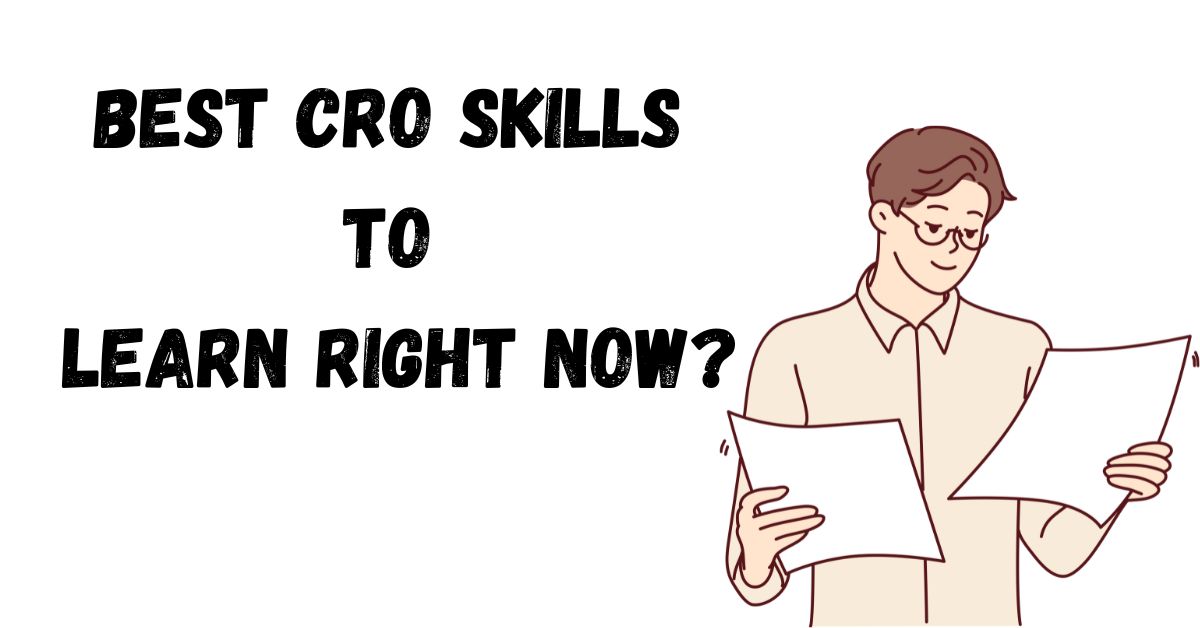15 Best CRO Skills That You Should Learn to Get Hired in 2024
In simple terms, CRO enhances your website to increase the percentage of visitors who complete key actions like making purchases or subscribing.
If you’re aspiring to become a CRO specialist or are a hiring manager seeking to understand the essential skills for candidates, you’re in the right place.
This guide will help you identify the best skills to learn for becoming a CRO, and highlight the important skills to look for during the hiring process.
After reading, you’ll have a better understanding and be equipped to make informed decisions about your next steps.
What are the Best Skills a CRO Should Have?
The most essential skills a CRO should have include a strong analytical ability to interpret data and user behavior, proficiency in A/B testing to refine web experiences, and a deep understanding of user experience (UX) design to enhance site navigation and interaction.
These said skills can make or break the qualities of the CRO that you’re hiring or the CRO that you want to become. With that said, let’s tackle each and every skill that a CRO should have, below:
1. Analytical Skills
CRO specialists must excel in data analysis, interpreting complex data to identify trends and insights that drive conversion improvements. Proficiency in tools like Google Analytics, Excel, and SQL is essential for deep-diving into data and making informed decisions based on user behavior and performance metrics.
2. A/B Testing and Experimental Design
Designing and executing A/B tests is a core function of CRO work. Specialists should be capable of planning, implementing, and analyzing the results of A/B tests to determine the most effective strategies for enhancing conversion rates.
3. Understanding of User Experience (UX) and Customer Journey
A thorough understanding of user experience design is crucial. CRO professionals need to create and optimize user journey maps to identify and alleviate pain points and conversion bottlenecks, ensuring a seamless user experience that promotes higher conversion rates.
4. Technical Proficiency
A strong grasp of web technologies (HTML, CSS, JavaScript) and the ability to implement changes based on test results are important. CRO specialists often need to collaborate closely with UX designers and web developers to put insights into action.
5. Strong Communication and Documentation Skills
Communicating findings and recommendations effectively to stakeholders and documenting insights and outcomes are key responsibilities. CRO specialists must be adept at preparing detailed reports and presenting complex data in an understandable manner.
6. Business Acumen and Strategic Thinking
Understanding the broader business context and aligning CRO strategies with overall business goals is essential. This includes knowledge of market trends, consumer behavior, and the competitive landscape to tailor optimization efforts accordingly.
CONSIDER READING: What are the Best Marketing Skills to Learn Right Now?
7. Creativity and Innovation
Innovative thinking helps in devising unique solutions that enhance user engagement and conversion rates. Creativity is especially important in developing testing strategies that push beyond conventional boundaries to discover new opportunities for growth.
8. Industry Research
Continual learning and research are vital in keeping up with the latest trends, tools, and methodologies in CRO and digital marketing. A proactive approach to learning and adapting new technologies can significantly enhance a CRO specialist’s effectiveness.
9. Cross-functional Collaboration
CRO specialists often work with marketing, sales, and product development teams. Effective collaboration across these teams ensures that CRO strategies are integrated smoothly and leverage diverse insights, enhancing the impact of optimization efforts.
10. Multivariate Testing
Beyond A/B testing, a CRO specialist should be skilled in multivariate testing, which involves testing multiple variables to determine how they interact and influence user behavior. This type of testing can provide deeper insights and more comprehensive data to inform optimization strategies.
11. Project Management
Effective project management skills are crucial for a CRO specialist. They need to manage multiple tests and optimization projects, often with varying timelines and objectives. Skills in project planning, resource allocation, and deadline management help ensure that CRO projects are executed efficiently and effectively.
12. Psychological Understanding
A deep understanding of consumer psychology can greatly enhance a CRO specialist’s ability to craft strategies that resonate with users. Knowledge of psychological principles such as the paradox of choice, social proof, and urgency can be used to design more compelling and persuasive user experiences.
13. Digital Marketing Integration
CRO does not exist in a vacuum. An understanding of other digital marketing disciplines such as SEO, content marketing, and social media can help CRO specialists align their efforts with broader marketing strategies, creating a more cohesive user experience and improving overall site performance.
14. Legal and Ethical Compliance
With the increasing importance of privacy and data protection, CRO specialists should be knowledgeable about legal and ethical standards, especially concerning user data. Understanding GDPR, CCPA, and other privacy laws is important to ensure that optimization strategies comply with regulations and maintain user trust.
15. Adaptability and Curiosity
The digital landscape is continually evolving, and a successful CRO specialist needs to be adaptable and curious. An eagerness to learn about new tools, technologies, and approaches can help keep strategies fresh and effective.
Tips When Learning All of These CRO Skills
Learning all the skills we just mentioned can be daunting—after all, there are many. But knowing where to look can help you cut unnecessary research time and cultivate these skills much faster.
Here are some tips that can help you do just that:
Start with the Basics of Web Analytics
Understanding web analytics is foundational for any CRO work. Begin with mastering Google Analytics, as it’s one of the most common tools used in CRO. There are free resources and official Google Analytics courses that can help you get started. Learning how to interpret data from this tool will provide you with insights into user behavior and help you measure the effectiveness of your tests.
Engage in Continuous Learning and Certification
CRO is a field that is constantly evolving, so continuous learning is key. Look for certification courses in CRO and related fields like UX design, digital marketing, and data analysis. Platforms like Coursera, Udemy, and LinkedIn Learning offer courses taught by industry experts. Certifications not only enhance your skills but also improve your credibility and resume.
We have a dedicated guide on which CRO resources you can learn from best. Check it out.
Practice A/B Testing with Real Projects
The best way to learn A/B testing is by doing. Use free tools like Google Optimize to start running experiments on live websites—perhaps on your own blog or a willing small business’s website. This hands-on experience will teach you about setting up tests, interpreting results, and making data-driven decisions.
Develop Your Technical Skills
If you’re not already familiar with basic web development languages like HTML, CSS, and JavaScript, now is the time to start learning. These skills are crucial for implementing changes based on your CRO findings. Resources like Codecademy and freeCodeCamp offer interactive coding lessons that are beginner-friendly.
Join CRO and UX Communities
Connecting with other CRO professionals can provide you with insights and advice that are invaluable. Join forums, LinkedIn groups, or local meetup groups focused on CRO and UX. Networking with professionals in these communities can lead to mentorship opportunities, and you can learn from the challenges and successes of others.
Learn from Case Studies and Industry Reports
Study case studies that showcase successful CRO strategies. Many blogs and companies publish case studies explaining their approach, the tests they ran, and the outcomes. Analyzing these can provide you with a better understanding of how theory translates into practice. Similarly, keeping up with industry reports helps you stay updated with the latest trends and best practices.
Experiment with User Psychology
Understanding the psychological aspects of user behavior can greatly enhance your CRO strategies. Read books or take online courses about consumer psychology and behavioral economics to understand what drives users to convert. Applying these principles can help you design more effective tests and improve your site’s user experience.
Balance Theory with Practical Application
While learning the theoretical aspects of CRO is important, balancing this with practical application is vital. Apply what you learn in real-world scenarios as soon as possible. Whether it’s through simulations, freelance projects, or your current job, applying the skills will help reinforce your learning and highlight areas that need further development.
FAQs
What are the best tools for CRO beginners to start with?
Beginners in CRO should start with user-friendly tools that provide essential analytics and testing capabilities. Google Analytics is fundamental for tracking user behavior and understanding traffic patterns. For A/B testing, Google Optimize offers a free version that integrates well with Google Analytics, making it ideal for newcomers. Hotjar is another great tool for visualizing user activity through heatmaps and user recordings.
What are some common mistakes in CRO and how can they be avoided?
Common mistakes in CRO include not setting clear testing goals, testing too many variables at once, and making decisions based on insufficient data. To avoid these, ensure that each test has a clear hypothesis and objective, limit the scope of A/B tests to a few variables to clearly identify what influences changes in performance, and gather enough data to reach statistical significance before making decisions.
Can CRO techniques vary by industry, and if so, how?
Yes, CRO techniques can vary significantly across industries due to different user expectations, buying behaviors, and sales cycles. For instance, e-commerce sites may focus more on optimizing checkout processes and product displays, while B2B websites might concentrate on optimizing lead generation forms and content offerings. Understanding the nuances of your specific industry is crucial for effective CRO.
Conclusion
Here at JWR, we understand that the need to continuously upskill is important. That’s why you’re here—because you want to learn more and do more than what your current skills can generate, right?
If so, then why don’t you head on over to our blog where we provide tons of helpful guides and articles that can help you with your journey.
Topics such as ‘What are the Best CRO Resources Available Right Now?’, ‘Best Marketing Skills to Invest In‘, and more can be found there.
In conclusion, by following these skills and tips we just mentioned, you can systematically enhance your CRO skills, making you a valuable asset in any digital marketing team. Each skill contributes to a holistic understanding of how to optimize websites for better performance and increased conversions.
We hope that we’ve helped you understand this topic a bit better, and just comment down below if you have any questions. Take care!







